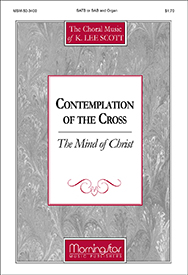- |
User Links
May the Mind of Christ, My Savior

May the mind of Christ, my Savior
Author: Kate B. Wilkinson (1925)Tune: ST. LEONARDS
Published in 63 hymnals
Printable scores: PDF, MusicXMLPlayable presentation: Lyrics only, lyrics + musicAudio files: MIDI, Recording
Representative Text
1 May the mind of Christ, my Savior,
live in me from day to day,
by His love and pow'r controlling
all I do and say.
2 May the word of God dwell richly
in my heart from hour to hour,
so that all may see I triumph
only through His pow'r.
3 May the peace of God my Father
rule my life in everything,
that I may be calm to comfort
sick and sorrowing.
4 May the love of Jesus fill me
as the waters fill the sea;
Him exalting, self abasing:
this is victory.
5 May I run the race before me,
strong and brave to face the foe,
looking only unto Jesus
as I onward go.
6 May His beauty rest upon me
as I seek the lost to win,
and may they forget the channel,
seeing only Him.
Source: Psalms and Hymns to the Living God #350
Author: Kate B. Wilkinson
Little is known about Kate Barclay Wilkinson’s (b. England, 1859; d. Kensington, England, 1928) life: a member of the Church of England, she was involved in a ministry to girls in London and a participant in the Keswick Convention Movement. She was married to Frederick Barclay Wilkinson. Bert Polman Go to person page >Text Information
Related Texts
| First Line: | May the mind of Christ, my Savior |
| Title: | May the Mind of Christ, My Savior |
| Author: | Kate B. Wilkinson (1925) |
| Meter: | 8.7.8.5 |
| Language: | English; Spanish |
| Refrain First Line: | May we run the race before us |
| Notes: | Spanish translation: "Tu poder, O Jesucristo" by Raquel Mora Martínez |
| Copyright: | Public Domain |
Chinese
English
- Ancient and Modern: hymns and songs for refreshing worship #727a
- Ancient and Modern: hymns and songs for refreshing worship #727b
- Anglican Hymns Old and New (Rev. and Enl.) #506
- Australian Hymn Book #537
- Baptist Hymnal (1975 ed) #328
- Christian Praise #d219
- Christian Worship (1993): a Lutheran hymnal #467
- Church Family Worship #452
- Church Hymnary (4th ed.) #536
- Common Praise: A new edition of Hymns Ancient and Modern #521 10 shown out of 52
Spanish
Notes
Scripture References:
st. 1 = Phil. 2:5
st. 3 = Col. 3:15
st. 5 = Heb. 12:1-2
In the first four stanzas of this "catalog" hymn the believer asks, "May the mind of Christ," the "word of God," the "peace of God," and the "love of Jesus" live in my heart throughout each day, in "all I do and say." Stanza 5 invokes the race-running imagery of Hebrews 12:1-2. The Psalter Hymnal Revision Committee omitted the final stanza for publication in the Psalter Hymnal and changed stanza 5 to the first person plural ("we/us") to provide a corporate finale. The song was first published in the London children's hymnbook Golden Bells (1925) and has gained popularity in recent hymnals.
This text is attributed to Kate Barclay Wilkinson (b. England, 1859; d. Kensington, England, 1928). She wrote this text in 1912 in six stanzas, inspired by Philippians 2:5: "Let this mind be in you, which was also in Christ Jesus" (KJV). Little is known about Wilkinson's life: a member of the Church of England, she was involved in a ministry to girls in London and a participant in the Keswick Convention Movement. She was married to Frederick Barclay Wilkinson.
Liturgical Use:
Dismissal at close of worship; immediately following the sermon. Change the "me/my" of stanzas 1 through 4 to "you/your" for use as a sung blessing on a wedding couple, on new members of the church, for sending out missionaries, for ordination of church officers, and so on.
--Psalter Hymnal Handbook, 1987
Tune
ST. LEONARDSA. Cyril Barham-Gould (b. England, 1891; d. Turnbridge Wells, Kent, England, 1953) composed ST. LEONARDS for Wilkinson's text while living at St. Leonards-on-Sea, England; it was published as the setting for that text in Golden Bells. The St. Leonard for whom St. Leonards-on-Sea is named and to whom…
Timeline
Arrangements
Media
- MIDI file from The Cyber Hymnal #4182
- Audio recording from Lift Up Your Hearts: psalms, hymns, and spiritual songs #334
- Audio recording from Lift Up Your Hearts: psalms, hymns, and spiritual songs #334
- Audio recording from Lift Up Your Hearts: psalms, hymns, and spiritual songs #334
- MIDI file from Psalter Hymnal (Gray) #291
- Audio recording from Small Church Music #227
- Audio recording from Small Church Music #227
- Audio recording from Trinity Hymnal (Rev. ed.) #644
- Audio recording from The Worshiping Church #560
- MIDI file from Worship and Rejoice #464
- MIDI file from With Heart and Voice: songs for all God's children #63


 My Starred Hymns
My Starred Hymns





